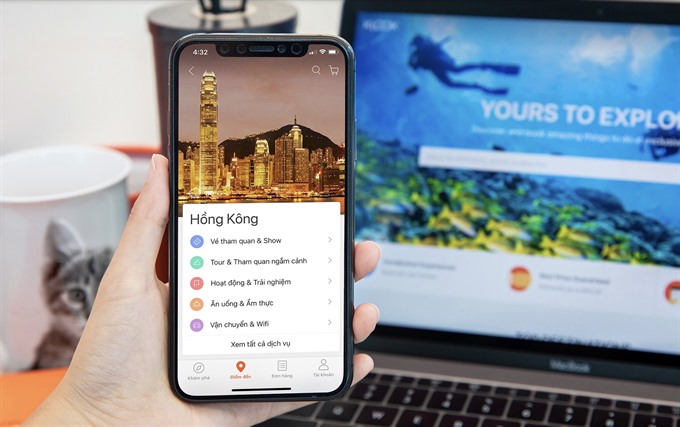Viet Nam News
A raft of new apps and sites is making it easier for travellers to access new and exciting experiences. Thu Ngân reports.
Trương Hồng Nhung, 35, of Hà Nội, has just finished a trip to a foreign country with her family.
Organising a trip had never been so easy for her.
Making plans for the whole family with “so many people and so many preferences” used to be an onerous task since she had to manage everything from booking air tickets and accommodation at good prices to finding restaurants and amusement places.
Not this time.
“All I needed was a smart phone and then I could get all the information and services I needed,” Nhung said.
The development of information technology and the widespread use of smartphones have changed the face of Vietnamese tourism with companies using big data, the Internet of Things and artificial intelligence (AI) to develop products and services.
Everything can now be done online through websites and smartphone applications of service providers and tour operators.
Sitting at home, people can use “smart tourism” which brings them quick, easy and convenient services and every scrap of information they need about destinations in and outside the country at a click.
Vũ Quốc Trí, chief of office at the Việt Nam National Administration of Tourism, said smart tourism is an inevitable trend and 60-70 per cent of tour operators in the country have developed their business online.
Lecturer Nguyễn Thu Thuỷ from HCM City National University, agreed: “There are many ways to apply technology to develop tourism. It can be AI, big data or Internet of Things.
“This is the best way to approach foreign visitors and advertise Vietnamese tourism.”
"Things like AI and virtual reality are been being developed in Việt Nam to enable people to admire the beauty of Sơn Đoòng Cave or Chùa Cầu (Bridge Pagoda) in Hội An even if they cannot go to those places."
In fact, smart tourism is attracting many customers, especially young people, thanks to a diverse range of services and options and promotions.
Besides, online tourism service providers offer advice about destinations and tips to travel and how to buy cheap tickets.
While in the past one could not look beyond an agoda.com or Booking.com, now there are a myriad of options like Klook, KKday, PYS Travel, Gotadi.com, Skyscanner Vietnam, Traveloka.
An expert said applying technology 4.0 would help tour operators cut costs and attract more customers and improve management and service quality.
According to the director of Gotadi.com, Lương Hoài Nam, a website providing air ticket, accommodation and tour services, smart tourism is still in its nascent stage but has already brought the sector many advantages.
His company’s turnover and number of users have doubled this year.
Start-ups stream in
As a promising area of business, smart tourism has attracted investment from not only experienced companies but also start-ups.
In recent years many Vietnamese and foreign start-ups have flocked to the market and many of them have called for big investments from giant investors.
Founded in 2014 by a Vietnamese start-up entrepreneur, Triip is an impact-travel company that brings together local experts and global travellers to create authentic local experiences.
With its roots in the sharing economy, the company enables passionate locals to become creators, creating their own private tours to share their passion with others, earn money and make new friends while also offering travellers one-of-a-kind local cultural experiences involving real people.
Through the website https://www.triip.me and mobile app, independent tour guides can post their “triip”, which is then available for travellers from around the world to discover.
Currently, there are 6,000 experts in 650 cities around the word using Triip, and around 70 per cent are women from low-income countries.
Triip successfully raised a seed round of US$500,000 in 2016, and an additional $150,000 strategic round in the second quarter of 2017 from Japan’s largest sharing economy platform for tours, Tabica.
CEO of Triip Hải Hồ said: “From day one we focused on impact: give women and locals around the world access to the global tourism industry.
“We’ve done so by making our margins minimal: 5-8 per cent of hotel bookings on triip.me will be given to impact organisations and by inverting the industry standard where tour guides earn less than 10 per cent of bookings, our local experts earn 90 per cent. You can even say we have created 6,000 jobs around the world already.
“Triip’s tourism and travel industry is bringing people closer together, providing untold stories from local people to tourists. We rely on humans to grow the company. So I think technology is only a tool to achieve that goal.”
Developed by two young Hong Kong entrepreneurs in 2014, Klook has now become one of the biggest online platforms in Asia offering many products to travellers like tickets to attractions and shows, tours and sightseeing, restaurants, transportation tickets and 4G wifi device renting.
Operating in 17 countries and territories, the company has so far raised $300 million from some large investors.
The company came to Việt Nam in April last year and started introducing its first products in July 2017.
A year later Klook becomes one of the most popular names among young travellers in Việt Nam.
The app offers users many promotions and travel tips. Under each product, they have content telling travellers how to use the service, how the destination is and even detailed instructions on which bus or metro route to take to a destination.
The number of visitors to the Klook app has been increasing consistently and the company’s business has grown strongly in the country.
Speaking to Việt Nam News, Trúc Nguyễn, the company’s e-commerce merchandising manager in Việt Nam, said her company has grown strongly.
"In Southeast Asia, the Vietnamese market is the fourth biggest in terms of revenues behind Singapore, the Philippines and Malaysia," she said. "Every day the company launches around 20 new travelling activities."
Business would continue to grow, she said, and the target is that soon 50 per cent of individual tourists going to Singapore and Thailand would use Klook’s services.
The figures are now 32 per cent for Singapore and 44 per cent for Thailand, she said.
Ecohost is another famous start-up in the sector. Founded in 2017, Ecohost seeks to connect Vietnamese and travellers who want to experience homestays in Việt Nam.
Bùi Thị Nhàn, founder of Ecohost, said: "Homestay standards in the country are not very good and locals are not able to develop services that meet international standards."
By setting up Ecohost she hoped to resolve the shortcomings plaguing many homestay services and develop a homestay community, she said.
“We will organise training programmes for locals in serving customers. We also offer them consultancy for setting up tours and improve service quality.”
She also revealed that the company was developing a platform to help homestay service owners better manage and develop their business to meet modern demands.
"It would digitise information about homestays so that they could be easily approached by customers," she said.
Ecohost’s business model makes sense since people living in rural and remote areas, where homestay services are mostly centred, are not very familiar with technology.
"The company would help local people explore their tourism potential while offering travellers many new tourism products of international quality," Nhàn said.
Though her company is still new, she already has plans to expand.
In 2018-19 it plans to develop in Nam Định, Sơn La and Lào Cai.
While for companies the race is tough and long, there is no question travellers are benefitting. VNS
 Features
Features






